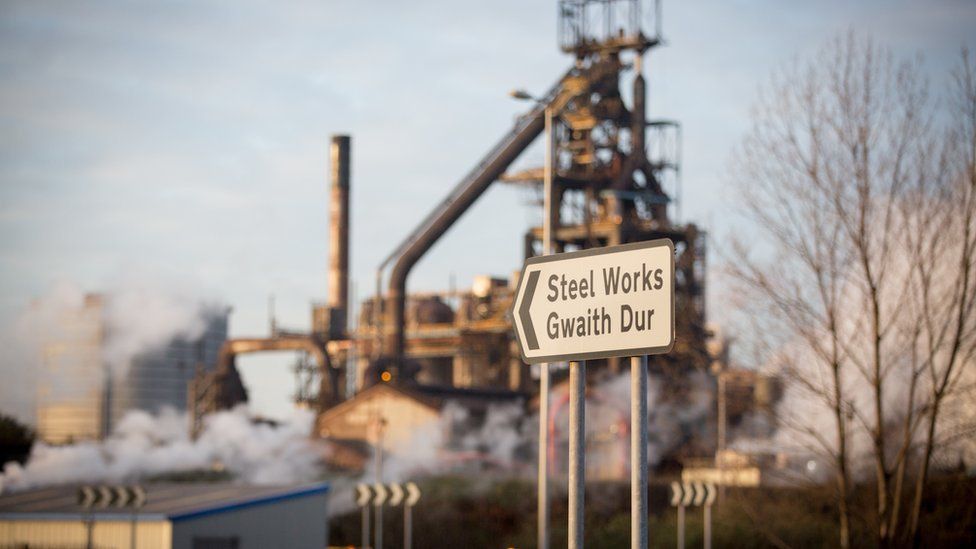Tata Steel: Half of Port Talbot jobs at risk, unions told
- Published

Half of the Tata Steel workers in Port Talbot are at risk of redundancy
Half of the workforce at Tata Steel's plant in Port Talbot are at risk of redundancy, unions have been told.
In total, the company has said 2,423 jobs across the UK are at risk, with 1,929 of those in Port Talbot, which employs 3,859 people.
Tata presented a breakdown of its proposed restructure to union bosses at a meeting in Birmingham on Friday.
It said it recognised this was an "unsettling" time and that it would support all those affected.
The firm wants to reverse more than a decade of losses and move to a greener future.
Steelworkers unions Community and Unite said they would continue to fight to save jobs.
There will now be a 45-day formal consultation on the restructuring.
There will be a phased closure of Tata Steel's two blast furnaces in Port Talbot, with the first furnace and coke ovens expected to cease operation by the middle of the year.
A winding down of its remaining heavy-end assets will follow in the latter half of 2024.
The closure of the blast furnaces this year will also affect workers in Llanwern in Newport, Shotton in Flintshire, Trostre in Carmarthenshire and Swansea University, as well as several sites in England.
Tata says the switch to electric arc furnaces could slash the Port Talbot site's emissions by about 85% a year
Tata intends to spend £1.25bn building an electric arc furnace in Port Talbot as part of its restructuring.
The UK government has offered £500m to the company to do this.
Unite called the redundancy plans short-sighted, adding they were not in the interests of the company, the workforce or Britain.
Its general secretary Sharon Graham said: "If Tata believes it will be a tick-box exercise on a done deal, it is very much mistaken. Unite will be meeting with members to discuss potential action."
Unite regional secretary for Wales, Peter Hughes, said: "The statutory consultation period of 45 days is entirely inadequate given the sheer scale of the proposed job losses and the knock-on effects they would have."
Community's Alun Davies said the union had told Tata it was not going to accept the plans.
"We will counter-propose something which will keep the blast furnaces going, because that's ultimately what we want to do," he said.
"It is a statutory 45-day consultation period, but it will take as long as it takes, as long as it is done properly."
He said Tata had been informed it would not be sticking to the 45 days.
Mr Davies said: "The company have acknowledged that so it doesn't mean that in 45 days time we get to a cliff-edge and we drop off the cliff. That's not happening."
He added: "We won't go quietly into the night.
"We don't have an option, so the company really have to listen to what we're saying, because if they don't, it might be a bigger fight than they could ever imagine.
"Because we won't let it go just like that. We can't."
GMB's Charlotte Brumpton-Childs said: "We do not accept the need for any non-compulsory job losses. We are engaging with our experts to analyse Tata's latest proposal."
An electric arc furnace at a steel plant in Izhevsk, Russia
Tata said it hoped for an "open and constructive" dialogue about the challenges the business was facing.
"We have submitted the headline numbers of roles that would be impacted at our UK sites, and shared these through the UK Steel Committee," a spokesman said.
"We understand what an unsettling time this is for our people and we are determined to give every support to our employees, contractor partners and communities with the help of the transition board, which met again yesterday."
The company said it would discuss the possibility of voluntary redundancies with unions and workers to minimise compulsory job losses, adding it did not expect to see any before before April.
A UK government spokesman said it understood this was a "concerning" time for Tata employees.
It called its £500m grant one of the "biggest support packages in history".
A further £100m, it said, had been gone toward creating a transition board - £80m from the UK government and £20m from Tata.
"This record level of support shows just how much the UK government values the Welsh steel industry and the people and communities whose livelihoods depend on it," a spokesman said.
Welsh government economy minister, Vaughan Gething, called the news "concerning" for steelworkers adding "the final whistle has not been blown".
Mr Gething said he and First Minister Mark Drakeford wanted the "best deal for steel".
"We do not want Tata to make any irreversible choices within this year, based on the current level of support from the current UK government."
Where are the at-risk jobs?
Of the roles at risk 1,929 are in Port Talbot while another 113 are at the firm's site in Llanwern, which employs 917 people.
Thirty-two jobs at Shotton, which employs 765 people, at at risk, while 22 of 29 jobs at Swansea University could go.
A further 12 jobs are at at risk in Trostre, where there are 656 workers.
Among jobs in England set to go are 30 in Corby, in Northamptonshire; 21 in Coventry and 19 in Wednesfield, both in the West Midlands.
Related Topics
- Published20 January
- Published31 January
- Published30 January